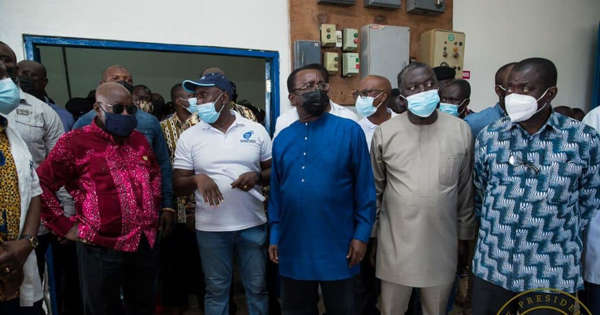1D1F’s scope expanding to rehabilitate major enterprises
The latest moves by government indicate that it is increasingly seeing its flagship one district one factory programme as a vehicle for rescuing moribund but strategic and still economically viable enterprises. A week ago, President Nana Akufo-Addo visited the premises of Darko Farms, the oldest private and largest poultry farm in Ghana, whose operations have been revamped by Government’s One District One Factory initiative, and was in triumphant mood over the gains already being made.
The latest moves by government indicate that it is increasingly seeing its flagship one district one factory programme as a vehicle for rescuing moribund but strategic and still economically viable enterprises. A week ago, President Nana Akufo-Addo visited the premises of Darko Farms, the oldest private and largest poultry farm in Ghana, whose operations have been revamped by Government’s One District One Factory initiative, and was in triumphant mood over the gains already being made.
With 1D1F support already turning the fortunes of Darko Farms around, it is most instructive that the President himself has now announced similar intentions for another major member of corporate Ghana, Neoplan, which used to be renown as a leading assembly plant for heavy duty vehicles, particularly large capacity passenger buses.
Effectively, this means the 1D1F initiative is being expanded into the territory of a plan hatched by Trade and Industry Minister, Alan Kyeremanten in 2017 to provide material and technical support for a number of strategically important economically viable, but operationally troubled companies. Even at that time there were worries that the Minister’s initiative and the 1D1F initiative would collide, and indeed this provided grounds for the 1D1F secretariat to pursue an institutional agenda be freed from the Ministry’s oversight on the basis that the Minister would favour his own initiative over the President’s with regards to allocation of time, effort and his Ministry’s material resources.
However it appears that the two separate initiatives are now being given common ground, rather than being treated as two distinctly separate programmes.
To be sure, these are by no means the first efforts by the ID1F initiative to support already existing companies that are facing financial or technical difficulties that are constraining institutional performance, even though they retain underlying economic viability. The difference now though is that whereas most of such already operating beneficiaries in the past were relatively little known outside their host communities, their immediate stakeholders and the other members of, the supply and value chains which they are part of, both Darko Farms and Neoplan have been household names in corporate Ghana for decades. Therefore whereas the status of most of the previous already existing beneficiaries was only made public by critics of the programme – particularly the incumbent government’s political opponents – and thus were widely seen as crying wolf, the latest support for two of Ghana’s most renown enterprises provides incontrovertible evidence that the 1D1F programme is not singularly aimed at creating new factories as originally claimed by its architects.

Several beneficiary companies may be lesser known but have been growing strongly long before they signed up to the 1D1F initiative; for example Unique Floral sited at Nsawam in the Eastern Region, Nelplast at Katamanso in the Kpone Katamanso District of the Greater Accra Region and Letap Pharmaceuticals in the Tema West District.
Critics argue that consequently Ghana is not getting the industrial breakthrough it had been promised prior to the 2016 general elections. But government retorts that the programme was never advertised as one aimed at creating brand new industries in each and every district; but one aimed at ensuring that every district has at least one factory that is operational, whether new or already in existence.
In truth, brownfield enterprises were always going to be attracted to the initiative with its array of fiscal incentives such as tax holidays of up to five years (renewable with the acquiescence of the Ministry of Finance), exemptions from and waivers on import duties and levies on equipment, plant and machinery as well as raw materials. Add to these total exemptions from payment of withholding tax on dividends as well as relief from double taxation for foreign investors and employees.
Critics argue that giving such incentives to already existing companies’ amounts to carelessly foregoing public revenues at a time they are direly needed. Government officials retort that these incentives are similar to locational fiscal incentives offered to enterprises that set up outside the urban centres, in order to encourage them to do so for much the same reasons as the 1D1F programme was set up in the first place.
Even as this controversy rages however, even government’s most ardent critics are hard put to fault the choices made with regards to which already existing, but troubled enterprises should be rehabilitated with the core support of the 1D1F programme, especially the latest two which both are of strategic importance to Ghana’s economy.
Having been a household name for most Ghanaians, having dominated most supermarkets and distribution outlets for fresh chicken particularly in Kumasi and Accra, Darko Farms went through a period of decline, due to major challenges that confronted the domestic poultry industry in the late 1990s including high cost of feed, inefficiencies across the value chain, high electricity and operational cost, as well as competition from cheap imported poultry products.
As part of Government’s Industrial Transformation Agenda, being implemented by the Ministry of Trade and Industry, Darko Farms Company was identified as one of the distressed but potentially viable companies.
As a result, the company, in 2017, applied to be part of the flagship 1-District-1-Factory initiative, and after a comprehensive review by the Technical Support Group of the Ministry, an amount of GH¢22.1 million was granted as a loan facility to the company by Ghana EXIM Bank.
Source: Goldstreetbusiness


